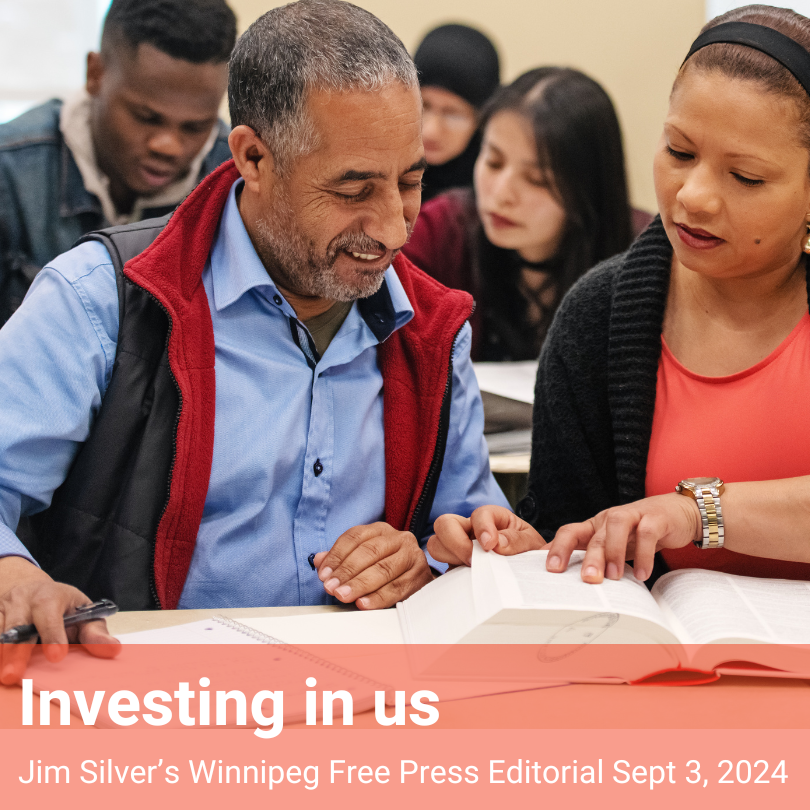
Previously published in the Winnipeg Free Press September 3, 2024
September 8, is International Literacy Day. Regrettably, few people know this. Literacy is a subject largely hidden from public view, even though a decade ago 192,000 Manitobans aged 18-65 years had literacy levels sufficiently low that they could not participate fully in society. In addition to these Manitobans, there are additional tens of thousands who, for various reasons, do not have a high school diploma and would like to earn one. Most cannot because for the past two decades, Manitoba’s adult basic education system has been underfunded, thus restricting access.
Adult basic education includes Adult Learning Centres (ALCs) that offer the mature high school diploma and Adult Literacy Programs (ALPs) that bring adults up to a level sufficient to start in a mature high school program.
The chronic underfunding of adult basic education produces a large opportunity cost. Earning a mature high school diploma and developing self-confidence and self-esteem creates a world of opportunities for people. Many find jobs that pay a living wage or pursue further training, resulting in employment that can pull entire families out of poverty. People on social assistance can become wage earners and taxpayers, producing a net fiscal benefit for all of us.
Over 24,000 adults have graduated with their mature high school diploma since 2003/04. Many had previously been on provincial social assistance. If even one in ten of these graduates moved each year from social assistance to a job with a living wage and stayed employed since graduation, the combination of social assistance savings and increased tax revenue would more than pay for the $20 million annual cost of Manitoba’s adult basic education program. If access to adult basic education diverted even one person per year from prison—a reasonable expectation—and each stayed out of prison until today, the accumulated savings would be far beyond the annual cost of adult basic education. In addition, research shows that the children of parents taking adult basic education are likely to do better in school, thus breaking the cycle of poverty and creating further fiscal benefits.
Investment in Manitoba’s adult basic education system pays for itself.
Last year Manitoba’s provincial government took two significant steps to improve adult basic education.
First, they enacted the Social Assistance Amendment Act, enabling adults on Employment and Income Assistance (EIA)—with its paltry, poverty-level supports—to attend adult basic education classes. Previously most of those on EIA were pushed into the labour market as quickly as possible. This so-called “work first” model—push social assistance recipients into the labour market immediately, despite their lack of education—has proved to be unsuccessful. It will be important for front-line EIA workers to be aware of the change and to work to get those on EIA who are capable and willing—there are many—into an adult basic education program. Improved social assistance rates would assist adult learners in being able to focus on their studies and successfully transition to a decent job.
Second, a new Adult Literacy Act was passed after it had been inexplicably repealed in 2021 by the previous provincial government. The Act includes the requirement that the provincial government implement an adult literacy strategy. This is important—low literacy skills adversely affect all aspects of a person’s life. It is hoped that the strategy includes a statement that education is a right to which everyone is entitled, as is contained in Section 26 of the 1948 Universal Declaration of Human Rights, and that a well-educated population is this province’s most important and valuable resource.
What will be especially important is that next Spring’s provincial budget, planning for which will be underway this Fall, includes a hefty increase in the allocation to adult basic education. Last year’s budget saw a 5 percent increase. What is needed is a doubling of the approximately $20 million annual budget. That amount would be transformative and would yield benefits for generations to come.
Investing in adult basic education is a preventive measure that will, over time, reduce the numbers of homeless people and the numbers of people committing serious crimes.
It is time to start investing in prevention. Doubling the adult basic education budget is a good place to start.
Jim Silver is Professor Emeritus at the University of Winnipeg and a Research Associate with the Canadian Centre for Policy Alternatives-Manitoba.
—


